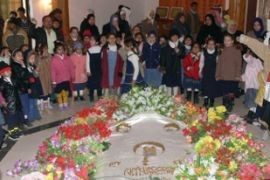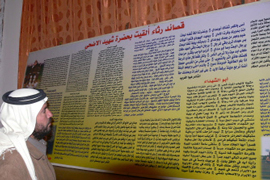Saddam execution anniversary marked
Graffiti inTikrit praise the slain leader one year after he was hanged.

Floral tribute
“There is no life without the sun and no dignity without Saddam,” read one slogan in Tikrit, north of Baghdad. “Paradise for the hero Saddam,” read another.
The graffiti appeared on buildings including the town’s police station and its agriculture and electricity directorates.
In Awja, a village near Tikrit, Reuters Television filmed men, women and children crowding around his flower-covered tomb in a hall attached to a mosque.
A group of about 25 men sat talking about life under Saddam and how Iraq had changed since his execution.
“A year has passed since the death of the leader but no positive changes have taken place. Things are worse – we are ruled by Iran and America. The leader has been killed to satisfy Iran,” said Adnan Jassim, 38, from Tikrit.
Stepped up security
Security has been stepped up in predominantly Sunni Arab provinces in
|
“A year has passed since the death of the leader but no positive changes have taken place. Things are worse – we are ruled by Iran and America. The leader has been killed to satisfy Iran” Adnan Jassim, a Saddam supporter from Tikrit |
anticipation of possible attacks by die-hard supporters of the former Iraqi leader and his Arab nationalist Baath Party.
Ahmed Saleh al-Jubouri, the head of the security committee in Saddam’s native Salahuddin province, said Iraqi security forces were on alert.
Curfews were enforced in Tikrit and the oil refinery city of Baiji to the north, although the curfew in Tikrit was later lifted. Residents also reported more checkpoints in the town and Iraqi security forces were protecting government buildings.
But the potential for violence appeared slight since many former pro-Saddam fighters have joined forces with the US military in the months since his execution to fight al-Qaeda, which Washington says is the biggest threat.
Rear Admiral Greg Smith, the US military spokesman, said: “We have not seen any increased violence associated with his death”.
Saddam, toppled in a US-led invasion in 2003, was convicted of killing scores of Shia men in the town of Dujail after an attempt on his life there in 1982.
Sunni Arab governments, including Egypt and Saudi Arabia, criticised the timing of the execution, which took place at the start of the Eid al-Adha religious feast.
Delayed excutions
Saddam’s half-brother, Barzan al-Tikriti, former judge Awad al-Bandar
and former vice-president Taha Yassin Ramadan followed him to the
 |
| Graffiti appeared on government buildings and the town’s police station |
gallows.
Saddam’s feared cousin, Ali Hassan al-Majeed, known as “Chemical Ali” for his use of poison gas against Iraq‘s minority Kurds, and two other former regime officials have been convicted of genocide in a separate trial and are awaiting execution.
Their execution, however, has been delayed by a wrangle among Nuri al-Maliki, the Shia prime minister, Jalal Talabani, the president and a Kurd who opposes the death penalty, and Tareq al-Hashemi, the vice-president and a Sunni Arab.
Talabani and al-Hashemi oppose the execution of former defence minister Sultan Hashem and insist that the hangings cannot go ahead without their authorisation. US forces have refused to hand over the men until the dispute is resolved.